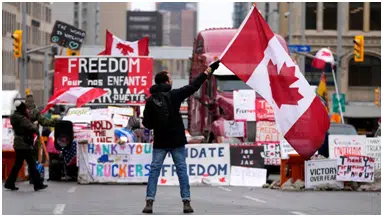Canada invokes emergency power
What is the news:
- Canadian Prime Minister Justin Trudeau on Monday activated rarely used emergency powers in an effort to end protests that have shut some U.S. border crossings and paralyzed parts of the capital.
- Under the Emergencies Act, the government introduced measures intended to cut off protesters’ funding and took steps to reinforce provincial and local law enforcement with federal police.
- “The blockades are harming our economy and endangering public safety,” Trudeau told a news conference. “We cannot and will not allow illegal and dangerous activities to continue.”
Canadian Civil Liberties Association :
- On Twitter, the association said, “The Emergencies Act can only be invoked when a situation ‘seriously threatens the ability of the Government of Canada to preserve the sovereignty, security and territorial integrity of Canada’ & when the situation ‘cannot be effectively dealt with under any other law of Canada. Governments regularly deal with difficult situations and do so using powers granted to them by democratically elected representatives. Emergency legislation should not be normalized. It threatens our democracy and our civil liberties.




About the Protest:
- The “Freedom Convoy” protests, started by Canadian truckers opposing a COVID-19 vaccinate-or-quarantine mandate for cross-border drivers, have drawn people opposed to Trudeau’s policies on everything from pandemic restrictions to a carbon tax. Copycat trucker protests have also sprung up in Israel, France, Australia and New Zealand.
- Protesters blockaded the Ambassador Bridge, a vital trade route between Windsor, Ontario, and Detroit, for six days before police cleared the protest on Sunday while others have shut down smaller border crossings in Alberta, Manitoba and British Columbia. Protests in Ottawa, the nation’s capital, entered a third week.
- Protesters camped in front of the Canadian Parliament, some of whom want the prime minister to meet with them, said the latest steps were excessive. “It’s an extreme measure that isn’t necessary,” said protester Candice Chapel.
- On Tuesday, Ottawa Police Chief Peter Sloly resigned under pressure because of his handling to the trucker protests in the city
Cutting off funds
- The financial measures bring crowdfunding platforms under terror-finance oversight, authorize Canadian banks to freeze accounts suspected of funding the blockades and suspend insurance on vehicles in the protests, Finance Minister Chrystia Freeland said.
- “We are making these changes because we know that these (crowdfunding) platforms are being used to support illegal blockades and illegal activity which is damaging the Canadian economy,” Freeland said.
- Canadian authorities have said about half of the funding for the protests has come from U.S. supporters. Toronto-Dominion Bank (TD.TO) last week froze two personal bank accounts that received C$1.4 million ($1.1 million) for the protests.
What is the Emergencies Act?
- The Emergencies Act, which came into force in 1988, allows the federal government to take “special temporary measures to ensure safety and security during national emergencies”.
- It is a temporary, 30-day measure that comes into effect immediately when invoked. But the Act must get approval within seven days from Canada’s Parliament.
What constitutes a national emergency?
The Act defines a national emergency as “an urgent and critical situation of a temporary nature” that:
- “seriously endangers the lives, health or safety of Canadians and is of such proportions or nature as to exceed the capacCheck Details on the recent news of the Report of 4th QUAD Ministerial Meeting held in Melbourne. Prepare current affairs for exams.ity or authority of a province to deal with it”, or
- “seriously threatens the ability of the Government of Canada to preserve the sovereignty, security and territorial integrity of Canada”
The emergency also “cannot be effectively dealt with under any other law of Canada”.
What powers does this grant the government?
Under the Emergencies Act, the government can use a range of additional powers, including the regulation or prohibition of:
- any public assembly “that may reasonably be expected to lead to a breach of the peace”
- travel to, from or within a specific area
- use of specific property
An Order in Council issued on Tuesday, which explains why the government believes the trucker blockades constitute a national emergency, also says potential measures can include the designation of protected places; the direction of any person to render essential services; the use of federal Royal Canadian Mounted Police (RCMP) to enforce municipal and provincial laws, and the imprisonment of, or imposition of fines on, people breaching the order.
Has this ever been used before?
- This is the first time the Emergencies Act has been used since it replaced the War Measures Act in 1988. Trudeau’s father, then-Prime Minister Pierre Trudeau, invoked the War Measures Act in 1970 in response to a wave of violence by hardline Quebec separatists. The period was known as the October Crisis.
What comes next?
- The Canadian government must go to Parliament to get approval to use the Emergencies Act.
- Canadian lawmakers were debating the issue in the House of Commons on Tuesday afternoon. If the House of Commons or the Senate does not agree with the decision to invoke the Act, the order will be rescinded.
- Jagmeet Singh, leader of the left-leaning New Democratic Party (NDP), said on Monday that he would support the move “given how serious the crisis is” – which CBC News reported would mean it will pass in the House.
- Neve told Al Jazeera that the question of whether invoking the Emergencies Act was necessary is on many people’s minds right now, “and would absolutely have to be one of the central considerations examined” in the inquiry that is held when the emergency order is lifted.

